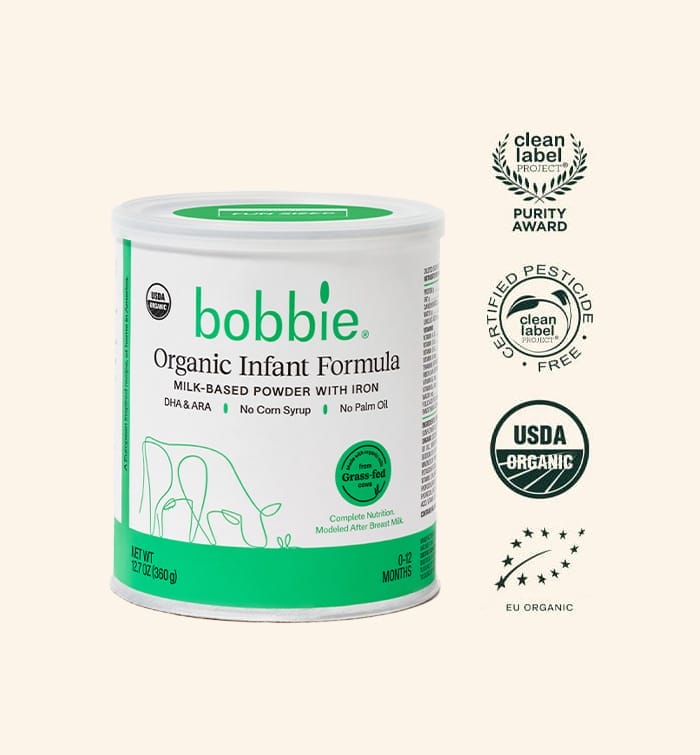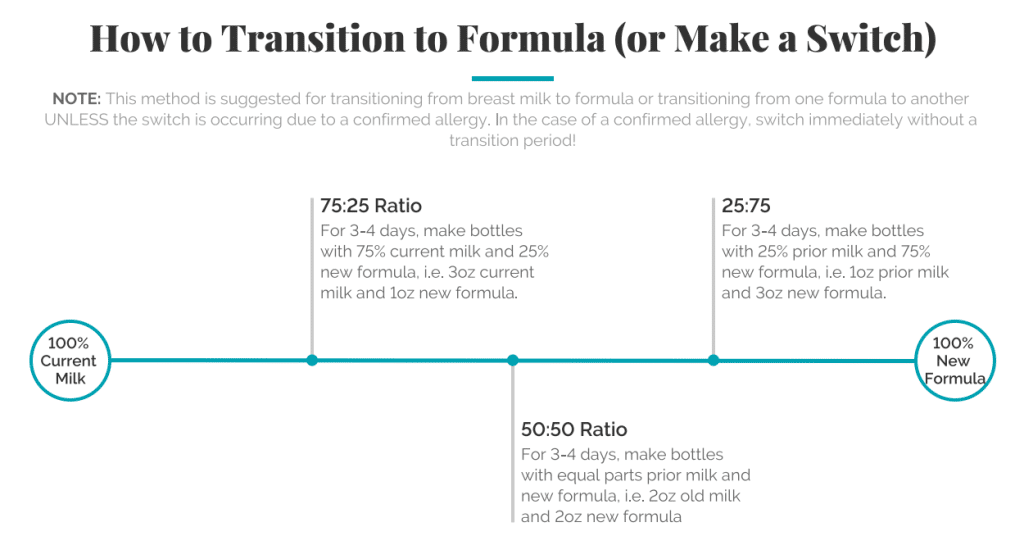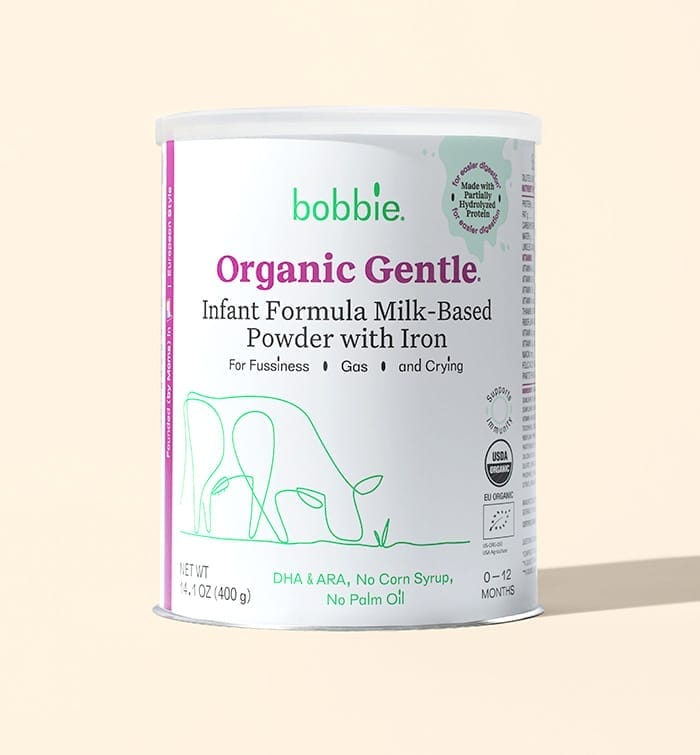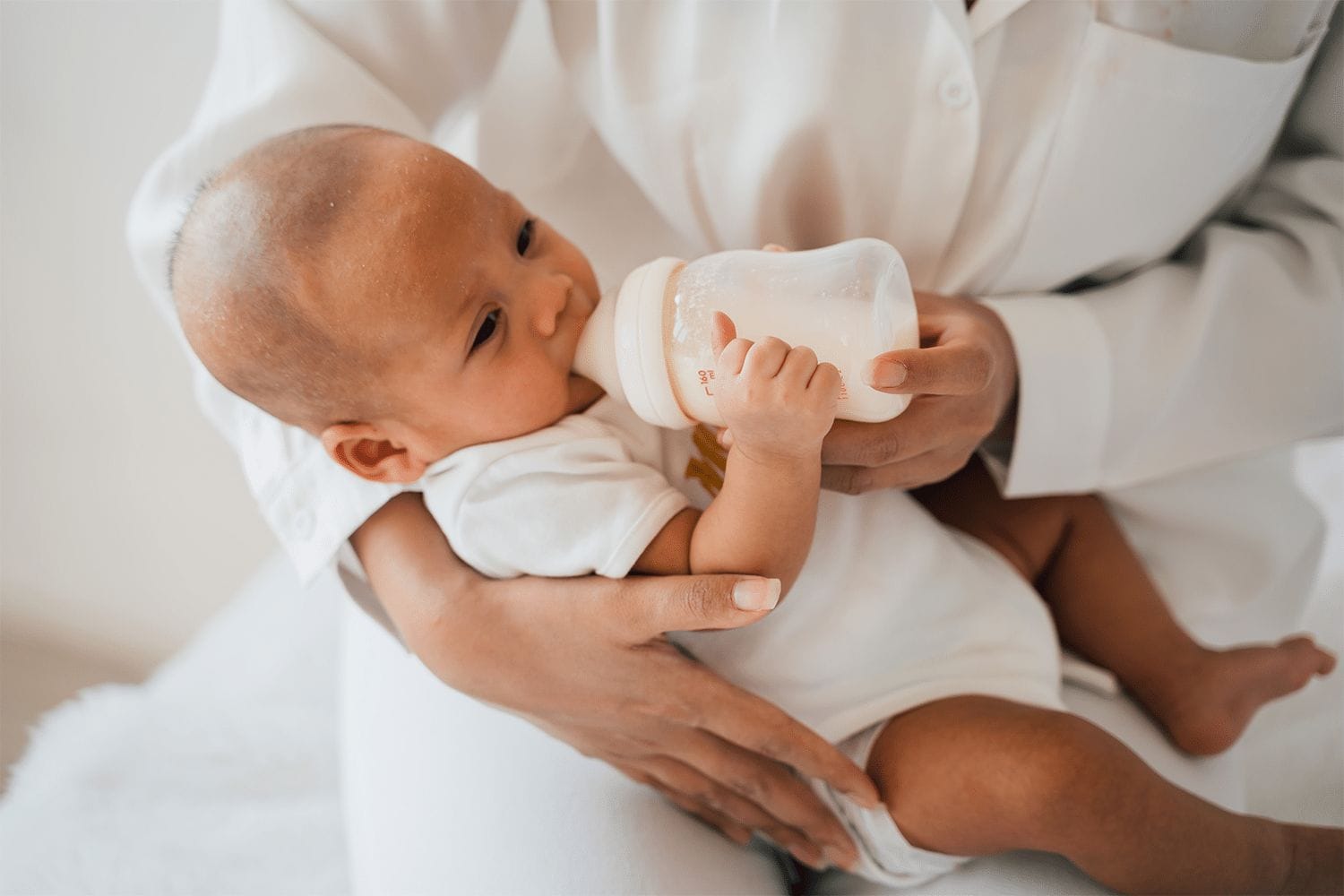We are proud to say that these posts are not sponsored. Our editorial team of Bobbie moms and writers personally select each featured product. If you buy something through our links, we may earn an affiliate commission, at no cost to you.
Formula changes happen for many reasons. There are allergies and medical issues as well as formula recalls and brand preferences. Babies can often switch formulas with no problems— even if that has to happen immediately due to unforeseen circumstances.
You may be wondering if switching formula can be done quickly or how long it takes for a baby to adjust to a formula change? We spoke to Lauren Crosby, MD, FAAP, and Bobbie Medical Advisor, to get all the answers when it comes to making a formula switch. She shares her steps in making the change and assures us that YES— a formula switch can happen cold turkey.
Reasons to Switch Baby Formula
Baby Formula Recalls and/or Availability
While rare, formula recalls do happen. One of the benefits to using a US based formula is the recall information is typically shared widely via traditional emails and social media. Recalls can also impact product availability in-store and online, and sometimes a formula switch may be necessary if the product you usually use is out-of-stock.
Switching Between Liquid Concentrate, Powder, or Ready-to-Feed Types
Many families switch formula type based on convenience, cost, and availability. Ready-to-feed formula is just that– ready to feed directly from the bottle. It is sterile, making it the best choice for babies that are premature or immunocompromised, and it is incredibly convenient for travel and being on the go. The downside, however, is that ready-to-feed formula has a significantly higher price compared to powdered formula. Another, lesser-known option is liquid concentrate formula. This option, which typically comes in cans or tetra-paks, is also convenient and just needs to be mixed with water (usually at a 1-to-1 water and formula ratio). While also expensive, on average it is cheaper than ready-to-feed. Many infants can switch between these types of formula without issue! Be aware, however, that some brands have different ingredients across powder, ready-to-feed, or concentrate products even if the product name is the same on each!
Switching from Non-Organic to Organic Formula
While both types of formula meet FDA regulations for nutritional composition for infants, organic formulas limit the use of certain conventional pesticides, antibiotics, or growth hormones. If parents prefer an organic baby formula, most babies can switch without issue as long as the key ingredients (protein type/size and carbohydrate source) are similar between the two products.

Shop Bobbie Organic Infant Formula
Bobbie Organic Infant Formula is a USDA Organic, EU-style infant formula that meets all FDA requirements. It is a complete nutrition milk-based powder modeled after breast milk and is easy on tummies. It is non-GMO and doesn't have corn syrup, palm oil, or maltodextrin. Learn more about Bobbie.
Advised by a Pediatrician to Switch Baby Formula
Your child’s doctor may recommend a switch based on your baby’s symptoms. Always consult with your doctor before making a switch!
- Diagnosed Allergy
Between 2.5-7% of babies have a milk protein intolerance (referred to as CMPI or CMPA). If your baby was diagnosed with milk allergy via a stool test, you will need to switch to a hypoallergenic formula.
- Blood in Stool
Blood in your baby’s diaper is never a good thing. Whether visible or hidden (occult), this typically means there’s a food sensitivity or allergy and a hypoallergenic formula will be needed.
- Diagnosed Condition
A diagnosed condition (such as FPIES, GERD, or metabolic disorders) may necessitate a formula switch to treat symptoms of the condition.
Personal Choice to Switch Formulas
Your needs matter, too! If a formula does not work for your budget, your values, your religious requirements (i.e. must not use certain animal by-products), etc. you might consider making a formula switch.
Things to Try Before Switching Baby Formula
Before you switch formulas it can be beneficial to try a few strategies first. Often, parents assume that the formula is the cause of a problem, when in reality their baby is experiencing normal infant digestive symptoms. In many cases, a simple switch of bottles, how baby is being fed, or the addition of a probiotic supplement can make an enormous difference.
Here are 7 tips you should try before jumping to an entirely new formula:
- Paced Feeding: Sometimes called “responsive feeding,” paced feeding is a method for bottle feeding that mimics feeding at the breast. Paced feeding strategies allow the baby to control the flow of breast milk or formula which helps to minimize excess air intake, gulping of milk/formula, and over feeding.
- Probiotics: The good bacteria found in a probiotic supplement can support the growth of healthy gut flora in your baby’s digestive tract. Some probiotics are also clinically shown to reduce colic symptoms.
- Gripe Water: Gripe water is an herbal supplement that may offer relief to babies who suffer from gas, colic, hiccups, or general fussiness. Gripe water is a homeopathic remedy without much clinical data to support its use. Please discuss with your pediatrician before offering to your baby.
- Use Anti-Gas/ Anti-Colic Bottles: These bottles are specially-designed to help reduce air intake during bottle feedings and are great at decreasing the amount of gas pain/discomfort for baby. Look for a bottle that offers some sort of venting system (within the bottle itself, collar, or nipple) to prevent baby from taking in extra air during feedings.
- Baby Massage: Gentle massage on an infant’s tummy can help encourage trapped air to move through the intestines and can relieve gas pain and discomfort. Gentle strokes in a clockwise or counterclockwise motion may help, as well as assisting your baby to do alternating “bicycle legs.”
- Sleep Intervention: Many symptoms of digestive distress can mimic those of overtiredness, particularly crying, fussiness, and symptoms of discomfort! Make sure sleep is on track before switching formulas (outside of obvious symptoms of allergy or intolerance).
- Decrease Nipple Flow: Finding the right nipple flow rate can be crucial in addressing digestive discomfort. A too-fast flow can result in gas (from gulping milk or formula too quickly), reflux, and overfeeding.
How to Switch Baby Formulas— From Gradual to Cold Turkey
Dr Crosby: If your child is on a cow milk-based formula, you can typically switch right over to another cow milk-based formula. If your child is on a special partially-hydrolyzed or hypoallergenic formula, you will want to switch to a new formula that has the same protein– either partially-hydrolyzed (gentle) or extensively-hydrolyzed (hypoallergenic). Some formulas are more appropriate than others for infants with allergy so if you are not sure what is equivalent, definitely check with your child’s doctor.
Dr Crosby: If you are making a transition and have some of the old brand left, you can start by mixing three parts old formula and one part new formula. If the baby drinks it, move to half and half and then 1/4 old and 3/4 new. Following that would be a full bottle of the new brand.
Here’s an example below of how a gradual switch might work. NOTE: In the case of a confirmed allergy, switch immediately without a transition period.

While transitioning formulas gradually is one method, parents may also want to know…
Can you switch baby formula cold turkey?
Dr Crosby: In a situation with recalls, poor product availability, or symptoms of allergy, parents may need to pivot to a different formula quickly— and that is perfectly fine to do. You can just throw out the prior formula and start with an equivalent formula ASAP.
According to the Switch Study— a recent clinical study by University of Virginia researchers, switching baby formula brands is safe and well tolerated in infants. In this specific study, funded by Perrigo Nutritionals, babies who switched from one milk-based formula to another milk-based formula didn’t experience an increase in spit up, burping, gas, crying or irritability compared to babies who stayed on the original milk-based brand.
“Based on data in our study, there is no statistically significant difference in tolerance variables in changing a baby’s formula,” says James L. Sutphen, M.D., Ph.D., of the University of Virginia department of pediatrics and the study’s lead researcher. “Switching baby formula brands is well tolerated, and we discovered there is no advantage to gradually switching versus immediately from one formula to another.”
Switching Baby Formula Side Effects
Dr Crosby: Typically if you’re switching to the same type of formula there shouldn’t be any significant side effects. Some babies are more sensitive to change than others. They might dislike the taste or they might spit up more.
Poop consistency might change. Babies might get constipated, or poop more often, or have more runny poops, or be gassy or more fussy. It can take a week or so for a baby to adjust to the change but if the symptoms are not causing much distress, it is ok to give it some time. If you have any concerns about side effects of changing formulas, reach out to your baby’s pediatrician and they will let you know what is normal.
How long after changing baby formula do you see side effects?
Dr Crosby: Usually a week is enough time for the baby to have fully transitioned to the new formula. You can monitor the baby’s symptoms that were the reasons a change was made. Some babies take to a change easily and some babies’ tummy’s need to adjust. It’s a good idea to monitor the volume of formula intake, poop consistency, sleep schedule, spitting up, skin changes and look for blood in the stool. If you see anything concerning, give your pediatrician a call.
Switching Baby Formula FAQs
How long does it take a baby to adjust to a new formula?
Dr Crosby: Sometimes when changing formulas, babies notice a difference in the taste, and this is more common with older babies. Often they get used to a new one quickly, but if they are giving you a hard time you should wait until they are very hungry as then they may be more accepting of a change.
How long does it take to transition baby formulas?
Dr Crosby: One to two weeks is a good transition period depending on how the baby is doing and how quickly the parents feel comfortable making the change.
How can I tell if a formula isn’t working for my baby?
Dr Crosby: These symptoms could mean that your formula is not agreeing with your baby. Speak to your pediatrician if you recognize any of the below signs.
- Spitting up more than usual and/or projectile vomiting
- Not drinking enough volume day after day
- Hard, pellet-like poops
- Watery or foamy poops
- Blood in the poop
- Crying more/more fussy
- Skin rashes or hives
What are the signs and symptoms of an allergy to formula, like a cow’s milk allergy?
Dr Crosby: If parents suspect an allergy, they should see their baby’s doctor to discuss their concerns, and have the baby weighed and examined. It’s a good idea to bring a fresh poop sample to the doctor’s visit. Allergy symptoms may include:
- Spitting up more than typical
- Poor appetite
- Not gaining weight well
- Watery poops
- Blood in the poop
- Crying more/more fussy
- Not sleeping well
- Skin rashes
When to switch to sensitive baby formula?
Dr Crosby: If your baby is very fussy, spits up constantly, is not gaining weight or feeding well, has blood in their stool, is very gassy or sleeps poorly because she seems to be uncomfortable, it’s time to talk to your pediatrician and see if it’s time to change to a gentle or hypoallergenic infant formula.
There are different types of gentle formulas depending on the baby’s symptoms. Some are hypoallergenic— meaning the proteins are broken down so they can be digested more easily without triggering an allergic response. These are for babies with diagnosed cow milk protein allergy. Other formulas contain partially-hydrolyzed proteins which could work for babies who are experiencing gas and/or fussiness but not a true milk allergy. Some formulas are made for “lactose sensitivity” but babies in general don’t have lactose intolerance so typically if that formula helps, it is because it also has some of the proteins broken down for easier digestion.
When to switch formulas because of gas?
Dr Crosby: Often parents think gas is the reason their baby is fussy, but that is not always the case. It can be one of many reasons why a baby is fussy.
If a baby cries a lot, then passes gas and seems relieved, then gas is likely the issue. If these episodes are not causing the baby to be very upset for a lot of the day, then it is fine not to do anything as long as the baby is growing well, pooping well without any blood in the stool, is happy and sleeping pretty well. If you think the baby is gassy, then make sure the baby burps well and consider trying a different type of bottle/nipple. An over-the-counter gas remedy might be recommended by your pediatrician as a next step, and if that doesn’t help then she might recommend a formula switch.

Shop Bobbie Organic Gentle Infant Formula
Bobbie Organic Gentle is the only baby formula in the U.S. market that offers 100% partially-hydrolyzed whey protein and 100% lactose as the carbohydrate source. Our gentle baby formula is easy on sensitive tummies to help alleviate fussiness and gas. Learn more about Bobbie Gentle.
Is it bad to keep switching baby formula?
It can take up to 1-2 weeks for a baby to fully adjust to a new formula. When possible, try to avoid switching formulas during this 1-2 week transition period as too many changes in a short period of time can often increase digestive upset and cause symptoms that may falsely indicate that baby is not tolerating a formula well.
Summary About Switching Baby Formula
Whether parents are exclusively formula feeding or supplementing with formula, there are lots of reasons a formula switch may happen. There may be a medical problem, a parent preference or a problem finding the usual formula. In general, this is a safe thing to do! As always, please involve your baby’s healthcare provider so you can get the best guidance on how to switch and what formula is best for your baby.

Shop Bobbie Organic Infant Formula
Bobbie Organic Infant Formula is a USDA Organic, EU-style infant formula that meets all FDA requirements. It is a complete nutrition milk-based powder modeled after breast milk and is easy on tummies. It is non-GMO and doesn't have corn syrup, palm oil, or maltodextrin. Learn more about Bobbie.

